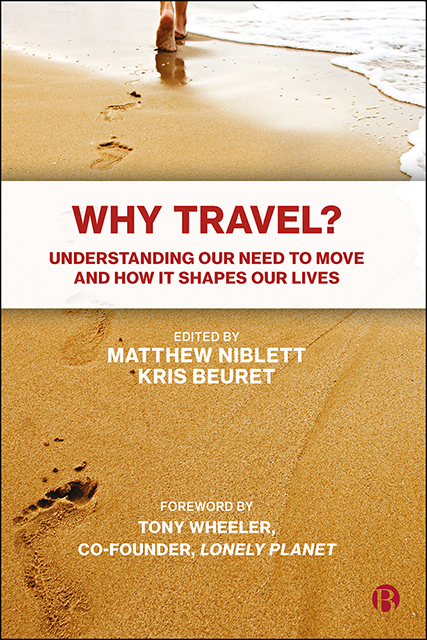Book contents
1 - Why Travel? An Introduction
Published online by Cambridge University Press: 21 April 2023
Summary
Why travel? We have all done it and, for most of us, travel fills our lives. Whether strolling to the shops, joining the commuter conveyer belt to work, or jetting off to foreign climes, we move and we travel. The importance of travel is seen in the way it shapes our society. Hence our strongest form of civil punishment is to imprison, to stop transgressors travelling and moving freely. Some of the most difficult aspects of the COVID-19 pandemic have stemmed from the ways in which it has resulted in restrictions on movement, and forced us to confront the extent to which we miss the freedoms associated with travel.
The place of travel at the core of our lives is hinted in our language and everyday interactions. We love to talk about travel, to moan about obstacles to travel and to dream about where it can take us; it is as good an ice-breaker as the weather and with far more conversation ‘mileage’. Indeed, there is no more frequent idiom than travel to describe our ‘life's journey’.
While we often view travel as a chore, the popularity of luxury liners and heritage trains (in which the journey is as important as the destination), and the undying appeal of a good walk to clear the head, suggest that we do not just do it because we have to but because we love to; because, on some fundamental level, we need to. Travel seems to have utility itself, and this appears no more clearly than at the current time, when the COVID-19 pandemic has dramatically reduced travel globally as a result of social distancing restrictions. Confined and limited in where we can move, people across the world have developed a fresh appreciation of the importance of travel to our existence.
When asked to identify the most basic elements of human existence, the immediate responses usually include breathing, eating, drinking or, perhaps, even reproduction. Movement, in spite of being as fundamental a part of human life as these other principles, is a less common response. But what drives human movement, and particularly our propensity to travel? On the surface such a question can appear facile, but on deeper reflection it unfolds as an issue of great complexity and, as such, has exercised human minds for millennia.
- Type
- Chapter
- Information
- Why Travel?Understanding Our Need to Move and How It Shapes Our Lives, pp. 1 - 10Publisher: Bristol University PressPrint publication year: 2021



